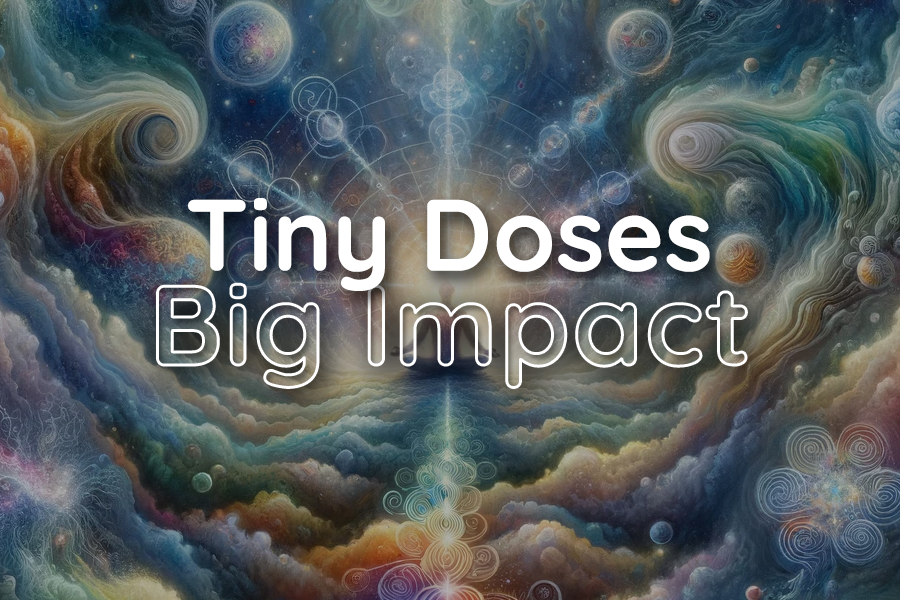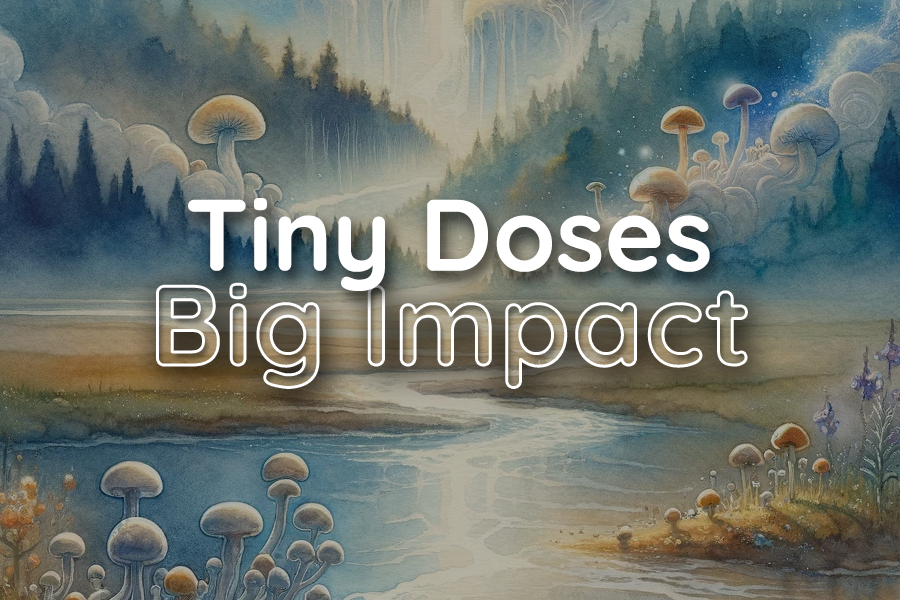Your cart is currently empty!
-
Tiny Doses, Big Impact: Exploring the Benefits of Microdosing

The concept of microdosing has emerged as a fascinating and unconventional practice. Microdosing, the act of consuming minute quantities of psychedelic substances, has piqued the interest of researchers, healthcare professionals, and individuals seeking alternative methods to enhance their well-being. While the idea may seem counterintuitive, an increasing body of research suggests that these tiny doses, far below the threshold for a full psychedelic experience, could potentially yield significant benefits. From boosting creativity and focus to alleviating symptoms of mental health conditions, microdosing is a captivating topic that warrants further exploration.
Unlocking the Secrets of Microdosing
Microdosing involves ingesting minuscule amounts of psychedelic compounds, typically around one-tenth to one-twentieth of a standard recreational dose. These substances can range from psilocybin (found in magic mushrooms) to LSD, mescaline, and DMT. The goal of microdosing is not to induce a psychedelic “trip” but rather to experience subtle shifts in perception, mood, and cognition.
Potential microdosing benefits
Creativity and Focus
One of the most commonly reported benefits of microdosing is an enhancement in creative thinking and improved focus. Many claim that these tiny doses help them tap into their creative reserves, generating fresh ideas and perspectives while maintaining heightened concentration.
Microdosing for anxiety and Mental Health
Preliminary research suggests that microdosing may have positive implications for mental health conditions such as depression, anxiety, and post-traumatic stress disorder (PTSD). Some individuals report experiencing reduced symptoms, increased emotional stability, and overall well-being.
Neuroplasticity and Cognitive Function
Microdosing Psychedelics are known to stimulate neuroplasticity, the brain’s ability to reorganize and form new neural connections. Microdosing may potentially facilitate this process, leading to improvements in cognitive function, learning, and memory.
The Science Behind Microdosing
While microdosing is still relatively new and understudied, researchers are eagerly exploring the mechanisms behind its potential benefits. One hypothesis suggests that Microdosing Psychedelics may influence the brain’s serotonin system, which plays a crucial role in regulating mood, perception, and cognition. Additionally, some studies have indicated that microdosing can increase brain-derived neurotrophic factor (BDNF) levels, a protein associated with neuronal growth and plasticity. This increased neuroplasticity may contribute to the reported cognitive enhancements and therapeutic effects.Challenges and Considerations
Despite the growing interest in microdosing, several challenges and considerations must be considered. The legal status of psychedelics varies globally, with most countries classifying them as controlled substances. Furthermore, the long-term effects of microdosing are not yet fully understood, and more research is needed to establish its safety and efficacy.
It is also essential to note that microdosing is not a one-size-fits-all solution, and individuals may experience varying responses. Some individuals may be more sensitive to the effects of psychedelics, while others may not experience any noticeable benefits.Conclusion
The practice of microdosing remains a fascinating and controversial topic in the realm of personal growth and well-being. While the potential benefits are intriguing, it is crucial to approach microdosing cautiously and seek guidance from qualified professionals. As research continues to shed light on this unconventional practice, it is essential to maintain an open yet critical mindset, weighing the potential risks and benefits carefully. Ultimately, the decision to microdose should be informed based on a thorough understanding of the available information and personal circumstances.FAQs
Are there any side effects associated with microdosing?
While microdosing is generally considered safe when done responsibly, some individuals may experience mild side effects such as headaches, nausea, or changes in perception. It’s important to start with very low doses and monitor your body’s response.
Can microdosing be addictive?
There is currently no evidence to suggest that microdosing itself is addictive.
How often should one microdose?
There is no definitive schedule for microdosing, as it depends on individual factors and desired effects. Many practitioners recommend following a cyclic pattern, such as microdosing every three or four days, with breaks in between.
Can microdosing interact with medications?
Yes, there is a possibility of interactions between psychedelics and certain medications, particularly those that affect the serotonin system. It’s crucial to consult with a healthcare professional before attempting microdosing if you are taking any prescribed medications.
Can microdosing help with specific mental health conditions?
While some individuals report improvements in conditions like depression, anxiety, and PTSD, the research on microdosing for specific mental health conditions is still limited. More studies are needed to establish its efficacy and potential therapeutic applications.
What are the potential benefits of micro dosing Canada?
Canadians interested in mental health and personal growth might be drawn to micro dosing’s potential to:
Reduce symptoms of anxiety and depression
Enhance focus and creativity
Boost overall well-being and mood -
Microdosing Psychedelics: Insights into the Practice and Potential
Exploring the Rise of Microdosing and Its Therapeutic Potential
The usage of psychedelic substances like LSD and psilocybin is undergoing a renaissance of sorts, with new research investigating their therapeutic potential. Paralleling this scientific renewal is the rise of microdosing psychedelics – the regular ingestion of very small doses that are not enough to cause visual hallucinations but may provide other benefits. Though the effects can vary between individuals, proponents report improvements in mood, focus, creativity and overall wellbeing from the microdosing protocol. As awareness and availability increase, insights into best practices, opportunities and limitations continue to develop.
What does Microdosing meaning?
The practice of using extremely small doses of psychedelic drugs, such as LSD or psilocybin, is known as microdosing. A microdose is approximately one-tenth the amount required to experience a high trip or hallucinations. Instead of dramatic psychedelic effects, the microdosing protocol aims for subtle but beneficial impacts on mood, thinking and behaviour. Enthusiasts implement varied microdosing schedules from several days on, then several off, to four or five consecutive days followed by a two-day break. The periodic protocol intends to achieve results without building tolerance.
Subjective Benefits and Drawbacks
The perceived benefits and effects of microdosing can differ based on the substance and individual. Many users report improvements in energy, focus, creativity or relief from anxiety and depression. Some feel more present, emotionally tuned in, inspired or productive. Others appreciate boosted sensory perception. However, response varies – some feel no effects, while a minority report increased anxiety. Rigorous research on the benefits is still limited. But anecdotal self-reports are largely positive, driving interest in microdosing psychedelics as a self-optimization tool. Some downsides include slight physical discomfort during coming up or coming down of doses.
Applications in Mental Health Treatment
Scientists are also exploring microdosing psychedelics as an adjunct to psychotherapy for conditions like microdosing for anxiety, PTSD and depression. Small doses taken under supervision may enhance treatment by increasing openness and enabling patients to reframe perspectives. Unlike full doses, microdosing allows patients to engage without the intense effects of a psychedelic experience. Research is still early stage, but findings indicate microdosing psychedelics could hold promise for treating some mental health conditions and warrants further study. However, self-medication without professional guidance carries risks.
Focus and Productivity Potential
Many microdoses report improved focus, motivation and work outputs. In Silicon Valley and beyond, microdosing has quietly gained popularity for its perceived benefits to productivity. Some claim that little amounts of psilocybin or LSD helped them achieve a fluid state of focus that was perfect for jobs demanding creativity and cognitive endurance. Others appreciate heightened present-moment awareness. Microdosing benefits can enhance work effectiveness, especially in high-performance fields.
Safety Considerations and Limitations
Despite promising anecdotal reports, microdosing psychedelics presents both medical uncertainties and legal issues that warrant caution. Effects likely depend on variables like dosing specifics, set and setting. Unknown long-term impacts need further study as well. Without regulation, substance purity and potency can vary. Possession of scheduled substances, even in microdoses, remains illegal in many places. While microdosing may offer certain benefits, it is not risk or consequence-free. Consulting a doctor helps identify health risks based on personal and family medical history. Many advocates urge pursuing natural mood and productivity boosters first before experimenting with microdosing psychedelics.
Conclusion
While outcomes can greatly vary between individuals, interest in microdosing psychedelics continues growing, and their therapeutic and performance-enhancing potential is explored. Current insights suggest microdosing may provide cognitive and mood benefits for some people, especially within structured frameworks like psychotherapy or creative industries. However, research remains limited, and risks like unclear long-term safety exist. Yet microdosing protocols offer promise that merits further study. Ongoing research and responsible practice will deepen insights into how to harness the benefits of psychedelic substances in small doses, most constructively.
FAQs
Q: How is microdosing viewed in Canada?
A: Microdosing psychedelics is gaining awareness in Canada as a promising wellness practice, and some areas support researching its medical applications to benefit those with mental health conditions potentially.
Q: Can microdosing help with depression?
A: A few preliminary studies show potent antidepressant effects, especially when paired with therapy. Self-medicating carries risks, but professionals may cautiously use microdoses to enhance treatment. Individuals with mood disorders should consult doctors before microdosing and not abruptly stop medications.
Q: Are there any serious health risks?
A: No severe adverse reactions have been reported to date from occasional microdosing of classic psychedelics like LSD and psilocybin when approached with care, knowledge and intention of improving well-being.
Q: Can microdosing improve focus and work performance?
A: Initial evidence through anecdotal reports and small preliminary studies suggests that microdosing may enhance cognitive functions related to focus, productivity, and problem-solving abilities for some individuals, potentially helping improve work performance.
